| Listing 1 - 10 of 12 | << page >> |
Sort by
|

ISBN: 0309057388 9786610191611 1280191619 0309590310 0585220247 9780585220246 Year: 1997 Publisher: Washington, D.C. National Academy Press
Abstract | Keywords | Export | Availability | Bookmark
 Loading...
Loading...Choose an application
- Reference Manager
- EndNote
- RefWorks (Direct export to RefWorks)
SCIENCE --- History --- Scientists --- Science --- Natural science --- Science of science --- Sciences --- Natural sciences
Book
ISBN: 2213599041 Year: 1997 Volume: *23 Publisher: Paris : Fayard,
Abstract | Keywords | Export | Availability | Bookmark
 Loading...
Loading...Choose an application
- Reference Manager
- EndNote
- RefWorks (Direct export to RefWorks)
Philosophy of science --- Positivism --- Positivisme --- Science --- Sciences --- Philosophy --- Philosophie --- -Natural science --- Science of science --- -Philosophy --- Methodology --- History --- Normal science --- Philosophie des sciences --- Philosophie et sciences
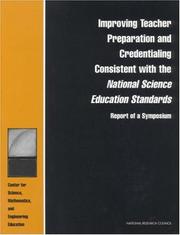
ISBN: 0309056926 9786610191666 128019166X 0309596807 058508453X 9780585084534 6610191662 9780309056922 9780309596800 Year: 1997 Publisher: Washington, DC : National Academy Press,
Abstract | Keywords | Export | Availability | Bookmark
 Loading...
Loading...Choose an application
- Reference Manager
- EndNote
- RefWorks (Direct export to RefWorks)
Science teachers --- Science --- Sciences - General --- Physical Sciences & Mathematics --- Congresses --- Certification --- Standards --- Study and teaching --- Natural science --- Science of science --- Sciences --- College science teachers --- Teachers --- Natural sciences
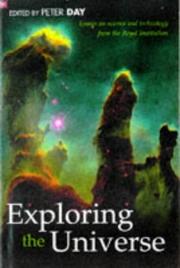
ISBN: 1283923769 0191506427 9780191506420 0198500858 9780198500858 Year: 1997 Publisher: Oxford [England] ; New York : Oxford University Press : Royal Institution,
Abstract | Keywords | Export | Availability | Bookmark
 Loading...
Loading...Choose an application
- Reference Manager
- EndNote
- RefWorks (Direct export to RefWorks)
This diverse selection of essays from the Royal Institution's Evening Discourses provides an accessible summary of current thinking in many areas of science and technology. Written by seven eminent contributors, the essays explore areas ranging from ancient aphrodisiacs to the latest pictures taken by the Hubble Space Telescope, from safety's debt to Davy and Faraday to the role of alcohol in the development of civilization. - ;Much of our present knowledge of the Universe has come from observations made over the centuries with ever more powerful telescopes, operating from isolated mountain to
Science. --- Technology. --- Applied science --- Arts, Useful --- Science, Applied --- Useful arts --- Science --- Industrial arts --- Material culture --- Natural science --- Natural sciences --- Science of science --- Sciences
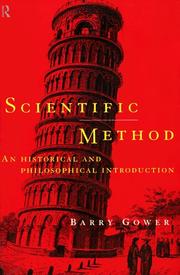
ISBN: 0415122821 9780415122825 Year: 1997 Publisher: London Routledge
Abstract | Keywords | Export | Availability | Bookmark
 Loading...
Loading...Choose an application
- Reference Manager
- EndNote
- RefWorks (Direct export to RefWorks)
The central theme running throughout this outstanding new survey is the nature of the philosophical debate created by modern science’s foundation in experimental and mathematical method. More recently, recognition that reasoning in science is probabilistic generated intense debate about whether and how it should be constrained so as to ensure the practical certainty of the conclusions drawn. These debates brought to light issues of a philosophical nature which form the core of many scientific controversies today. Scientific Method: A Historical and Philosophical Introduction presents these debates through clear and comparative discussion of key figures in the history of science. Key chapters critically discuss *Galileo’s demonstrative method, Bacon’s inductive method, and Newton’s rules of reasoning * the rise of probabilistic `Bayesian’ methods in the eighteenth century * the method of hypotheses through the work of Herschel, Mill and Whewell * the conventionalist views of Poincaré and Duhem * the inductivism of Peirce, Russell and Keynes * Popper’s falsification compared with Reichenbach’s enumerative induction * Carnap’s scientific method as Bayesian reasoning The debates are brought up to date in the final chapters by considering the ways in which ideas about method in the physical and biological sciences have affected thinking about method in the social sciences. This debate is analyzed through the ideas of key theorists such as Kuhn, Lakatos, and Feyerabend.
Science --- Methodology. --- Methodology --- Philosophy. --- History. --- Hulpwetenschappen --- filosofie --- filosofie. --- Filosofie. --- Natural science --- Science of science --- Sciences --- Scientific method --- Logic, Symbolic and mathematical --- Methodology&delete& --- History --- Philosophy --- Natural sciences --- Science - Methodology. --- Science - Methodology - Philosophy. --- Science - Methodology - History.
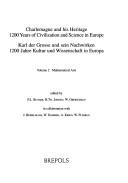
ISBN: 2503506747 2503506739 Year: 1997 Volume: Band II Publisher: Turnhout Brepols
Abstract | Keywords | Export | Availability | Bookmark
 Loading...
Loading...Choose an application
- Reference Manager
- EndNote
- RefWorks (Direct export to RefWorks)
Charlemagne Emperor --- Science, Medieval --- Civilization, Medieval --- Learning and scholarship --- Carolingians --- Sciences médiévales --- Civilisation médiévale --- Savoir et érudition --- Carolingiens --- History --- Histoire --- Charlemagne, --- Europe --- Intellectual life --- Vie intellectuelle --- Mathematics --- -Science --- -Science, Medieval --- -Civilization, Medieval --- Medieval civilization --- Middle Ages --- Civilization --- Chivalry --- Renaissance --- Medieval science --- Natural science --- Science of science --- Sciences --- Math --- Science --- Natural sciences --- -Medieval science --- -Natural science --- -History
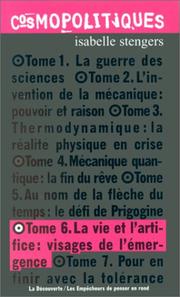
ISBN: 2707127000 9782707127006 9782707127617 2707127612 Year: 1997 Volume: 6 Publisher: Paris Éditions La Découverte
Abstract | Keywords | Export | Availability | Bookmark
 Loading...
Loading...Choose an application
- Reference Manager
- EndNote
- RefWorks (Direct export to RefWorks)
Social psychology --- Science --- Philosophy. --- History. --- 141.2 --- -Science --- -141.2 --- Natural science --- Science of science --- Sciences --- Stelsels met betrekking tot het oordeel omtrent de waarde der wereld --- History --- Philosophy --- 141.2 Stelsels met betrekking tot het oordeel omtrent de waarde der wereld --- Normal science --- Philosophy of science --- vie --- Philosophie et sciences --- Vie. --- Science - Philosophy. --- Science - History. --- Communication in politics --- Communication - Political aspects --- Manipulative behavior --- Manipulation (Psychology) --- Communication orale --- Langage politique --- Manipulation (psychologie) --- Persuasion (psychologie) --- Communication en politique --- Désinformation --- Propagande --- Communication
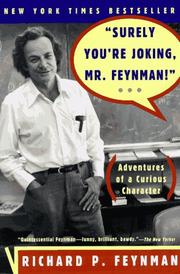
ISBN: 9780393316049 0393019217 9780393019216 0393316041 Year: 1997 Publisher: New York W.W. Norton
Abstract | Keywords | Export | Availability | Bookmark
 Loading...
Loading...Choose an application
- Reference Manager
- EndNote
- RefWorks (Direct export to RefWorks)
Winner of the Nobel Prize for Physics in 1965, Richard Feynman was one of the world's greatest theoretical physicists, but he was also a man who fell, often jumped, into adventure. An artist, safecracker, practical joker and storyteller, Feynman's life was a series of combustible combinations made possible by his unique mixture of high intelligence, unquenchable curiosity and eternal skepticism. Over a period of years, Feynman's conversations with his friend Ralph Leighton were first taped and then set down as they appear here, little changed from their spoken form, giving a wise, funny, passionate and totally honest self-portrait of one of the greatest men of our age.
Physicists --- Science --- Feynman, Richard P. --- Feynman, Richard Phillips, --- Feĭnman, Richard P., --- Feynman, R. P. --- פינמן, ריצ'רד פיליפס. --- Physics --- Feynman, Richard P --- (Richard Phillips), 1918 --- -Physicists --- #SBIB:316.23H2 --- Sociologie van de wetenschappen --- -1945-1990 --- 53 --- -Science --- -#WSCH:AAS2 --- Natural science --- Science of science --- Sciences --- 53 Physics --- Biography --- Humor --- Feynman, Richard Phillips --- #WSCH:AAS2 --- Feynman, Richard Phillips. --- -Feynman, Richard P. --- Biography. --- Humor. --- Physiciens --- 1945-1990 --- Anecdotes --- Anecdotes. --- 53 Fysica. Natuurkunde --- Fysica. Natuurkunde --- (Richard Phillips), 1918-
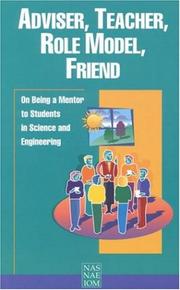
ISBN: 0309063639 9786610210190 1280210192 0309592763 0585002045 9780585002040 9780309063630 0309132673 Year: 1997 Publisher: Washington, D.C. : National Academy Press,
Abstract | Keywords | Export | Availability | Bookmark
 Loading...
Loading...Choose an application
- Reference Manager
- EndNote
- RefWorks (Direct export to RefWorks)
Engineering -- Study and teaching -- Handbooks, manuals, etc. --- Faculty advisors -- Handbooks, manuals, etc. --- Mentoring in science -- Handbooks, manuals, etc. --- Science -- Study and teaching -- Handbooks, manuals, etc. --- Science --- Engineeering --- Faculty advisors --- Mentoring in science --- Technology, Industry, and Agriculture --- Education --- Natural Science Disciplines --- Persons --- Disciplines and Occupations --- Technology, Industry, Agriculture --- Anthropology, Education, Sociology and Social Phenomena --- Named Groups --- Mentors --- Engineering --- Teaching --- Physical Sciences & Mathematics --- Sciences - General --- Handbooks, manuals, etc --- Study and teaching --- Mentors in science --- Academic advisors --- Advisors, Faculty --- Construction --- Natural science --- Science of science --- Sciences --- Student counselors --- Industrial arts --- Technology --- Natural sciences
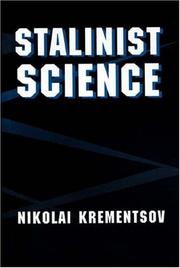
ISBN: 069102877X 9786612753152 1400822149 1282753150 1400812437 9781400822140 9781400812431 9780691028774 9781282753150 6612753153 Year: 1997 Publisher: Princeton, N.J. Princeton University Press
Abstract | Keywords | Export | Availability | Bookmark
 Loading...
Loading...Choose an application
- Reference Manager
- EndNote
- RefWorks (Direct export to RefWorks)
Some scholars have viewed the Soviet state and science as two monolithic entities--with bureaucrats as oppressors, and scientists as defenders of intellectual autonomy. Based on previously unknown documents from the archives of state and Communist Party agencies and of numerous scientific institutions, Stalinist Science shows that this picture is oversimplified. Even the reinstated Science Department within the Central Committee was staffed by a leading geneticist and others sympathetic to conventional science. In fact, a symbiosis of state bureaucrats and scientists established a much more terrifying system of control over the scientific community than any critic of Soviet totalitarianism had feared. Some scientists, on the other hand, developed more elaborate devices to avoid and exploit this control system than any advocate of academic freedom could have reasonably hoped. Nikolai Krementsov argues that the model of Stalinist science, already taking hold during the thirties, was reversed by the need for inter-Allied cooperation during World War II. Science, as a tool for winning the war and as a diplomatic and propaganda instrument, began to enjoy higher status, better funding, and relative autonomy. Even the reinstated Science Department within the Central Committee was staffed by a leading geneticist and others sympathetic to conventional science. However, the onset of the Cold War led to a campaign for eliminating such servility to the West. Then the Western links that had benefited genetics and other sciences during the war and through 1946 became a liability, and were used by Lysenko and others to turn back to the repressive past and to delegitimate whole research directions.
Communism --- Science --- History --- History. --- Stalin, Joseph, --- Soviet Union --- Politics and government --- Bolshevism --- Communist movements --- Leninism --- Maoism --- Marxism --- Trotskyism --- Natural science --- Science of science --- Sciences --- Djougatchvili, Iossif Vissarionovitch, --- Джугашвили, Иосиф Виссарионович, --- Dzhugashvili, Iosif Vissarionovich, --- Koba, --- Shih-tʻai-lin, --- Sidalin, --- Ssu-ta-lin, --- Stalin, Giuseppe, --- Сталин, И. В. --- Stalin, I. V. --- Сталин, Иосиф, --- Stalin, Iosif, --- Сталин, К., --- Stalin, K., --- Staline, --- Staline, Joseph, --- Staljin, J. V., --- Sutārin, --- Soselo, --- Stalini, Ioseb Besarionis że, --- Sṭalin, Y. Ṿ., --- Sṭalin, Y., --- Stalin, Josef, --- Stalin, Josef Vissarionovich, --- סטאלין, יאסיף, --- סטאלין, י. --- סטאלין, י. וו --- סטאלין, י. װ. --- סטאלין, י., --- סטלין, יוסיף ויסאריונוביץ׳, --- סטלין, יוסף --- 斯大林, --- Stalin, Jossif Vissarionovitš, --- Sztálin, Joszif, --- Istālīn, Yūsīf Vīsāryūnūvīch, --- استالين، يوسيف ويساريونووتج, --- Collectivism --- Totalitarianism --- Post-communism --- Socialism --- Village communities --- Natural sciences --- Σταλιν, Ιωσηφ, --- Stalin, Ιōsēph, --- Jughashvili, Ioseb, --- Jughashvili, Ioseb Vissarionovich, --- Jughashvili, Koba,
| Listing 1 - 10 of 12 | << page >> |
Sort by
|

 Search
Search Feedback
Feedback About
About Help
Help News
News